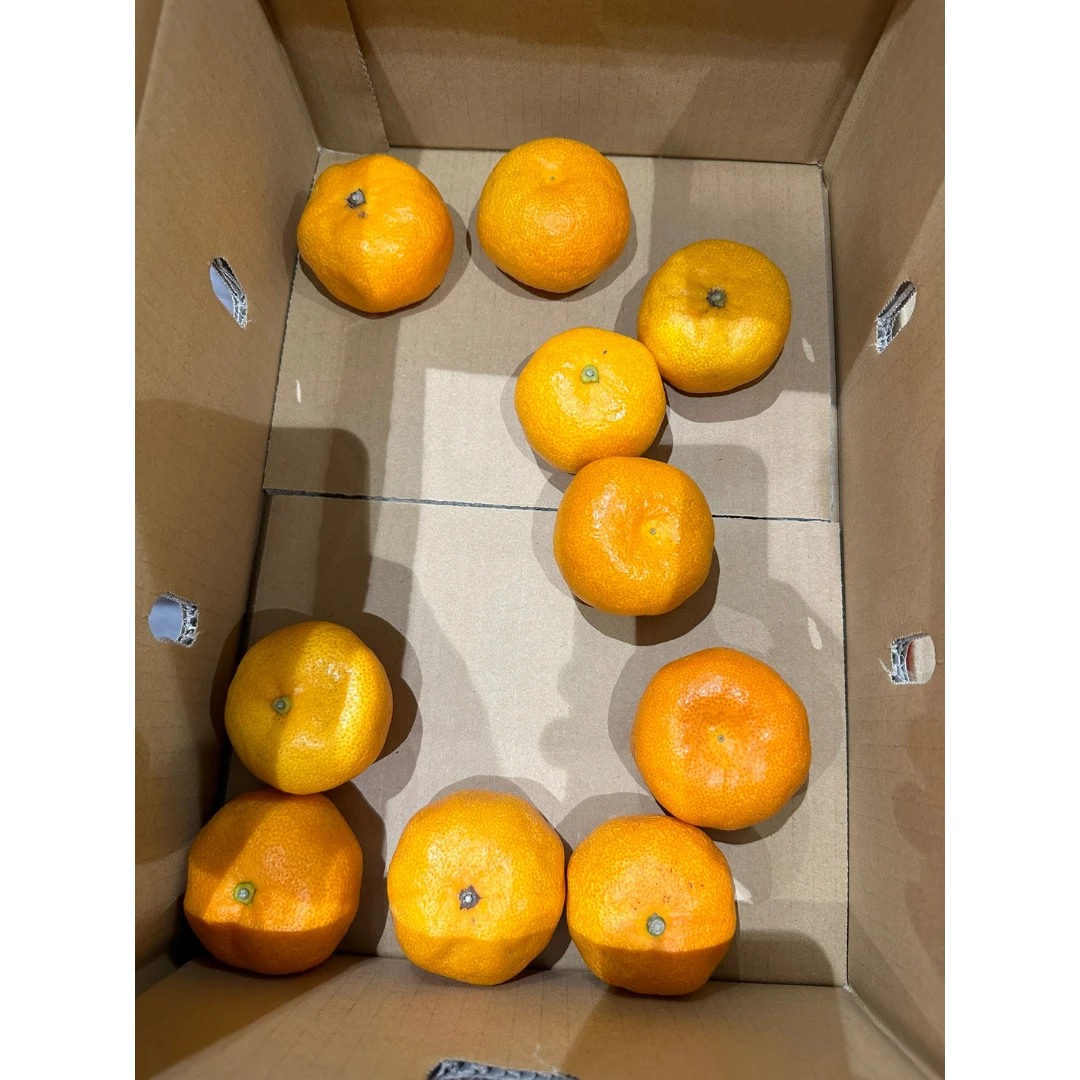UNSHŪ MIKAN - JAPANASE ORANGE - Citrus unshiu

Description
温州蜜柑 UNSHŪ MIKAN - JAPANASE ORANGE - Citrus unshiu
Texture/Flavor Profile
Unshū Mikan offers a melt-in-your-mouth juiciness with a delicate balance of sweetness and subtle tanginess. Its flesh is tender, seedless, and succulent, delivering a citrusy burst that feels refreshing yet gentle. The thin, easy-to-peel rind releases a fragrant, citrus aroma, enhancing the experience.
Availability/Seasonality
Unshū Mikan is available from late fall to spring, peaking in flavor from December to February. This cold-hardy fruit thrives in milder climates, with the sweetest varieties harvested in the winter months when temperatures drop, intensifying their natural sweetness.
About
Scientific Name: Citrus unshiu. Unshū Mikan, known as the "Satsuma" in English, has been cherished in Japan for centuries. Originating in Kagoshima Prefecture, this seedless mandarin variety became synonymous with winter traditions. Its rich vitamin C content and sweet, juicy flesh make it a beloved citrus, perfect for Japan's colder months.
Preparation
Enjoy Unshū Mikan peeled and segmented as a fresh snack, or incorporate it into salads, fruit sandwiches, parfaits, or desserts like sorbet and mochi. The juice is perfect for cocktails, dressings, or marinades. Mikan peels can also be dried and ground into "chimpi" powder, used to flavor teas, sauces, and soups.
Nutritional Value
Unshū Mikan is rich in vitamin C, aiding immunity, skin health, and collagen production. It also contains potassium, vitamin A, calcium, and dietary fiber, making it a nutrient-packed, low-calorie treat that supports overall wellness.
Selection and Storage
Select Mikans with vibrant, blemish-free skin that feels heavy for their size, indicating juiciness. Store at room temperature for up to 3 days or refrigerate for up to 2 weeks to maintain freshness. For longer storage, peel and freeze the segments to enjoy later.
Summary
Unshū Mikan, with its sweet, tangy flavor and easy-to-peel nature, embodies Japan's winter citrus tradition. Its versatility in fresh and cooked dishes, combined with its nutritional benefits, makes it a must-have ingredient in every kitchen.
Texture/Flavor Profile
Unshū Mikan offers a melt-in-your-mouth juiciness with a delicate balance of sweetness and subtle tanginess. Its flesh is tender, seedless, and succulent, delivering a citrusy burst that feels refreshing yet gentle. The thin, easy-to-peel rind releases a fragrant, citrus aroma, enhancing the experience.
Availability/Seasonality
Unshū Mikan is available from late fall to spring, peaking in flavor from December to February. This cold-hardy fruit thrives in milder climates, with the sweetest varieties harvested in the winter months when temperatures drop, intensifying their natural sweetness.
About
Scientific Name: Citrus unshiu. Unshū Mikan, known as the "Satsuma" in English, has been cherished in Japan for centuries. Originating in Kagoshima Prefecture, this seedless mandarin variety became synonymous with winter traditions. Its rich vitamin C content and sweet, juicy flesh make it a beloved citrus, perfect for Japan's colder months.
Preparation
Enjoy Unshū Mikan peeled and segmented as a fresh snack, or incorporate it into salads, fruit sandwiches, parfaits, or desserts like sorbet and mochi. The juice is perfect for cocktails, dressings, or marinades. Mikan peels can also be dried and ground into "chimpi" powder, used to flavor teas, sauces, and soups.
Nutritional Value
Unshū Mikan is rich in vitamin C, aiding immunity, skin health, and collagen production. It also contains potassium, vitamin A, calcium, and dietary fiber, making it a nutrient-packed, low-calorie treat that supports overall wellness.
Selection and Storage
Select Mikans with vibrant, blemish-free skin that feels heavy for their size, indicating juiciness. Store at room temperature for up to 3 days or refrigerate for up to 2 weeks to maintain freshness. For longer storage, peel and freeze the segments to enjoy later.
Summary
Unshū Mikan, with its sweet, tangy flavor and easy-to-peel nature, embodies Japan's winter citrus tradition. Its versatility in fresh and cooked dishes, combined with its nutritional benefits, makes it a must-have ingredient in every kitchen.
